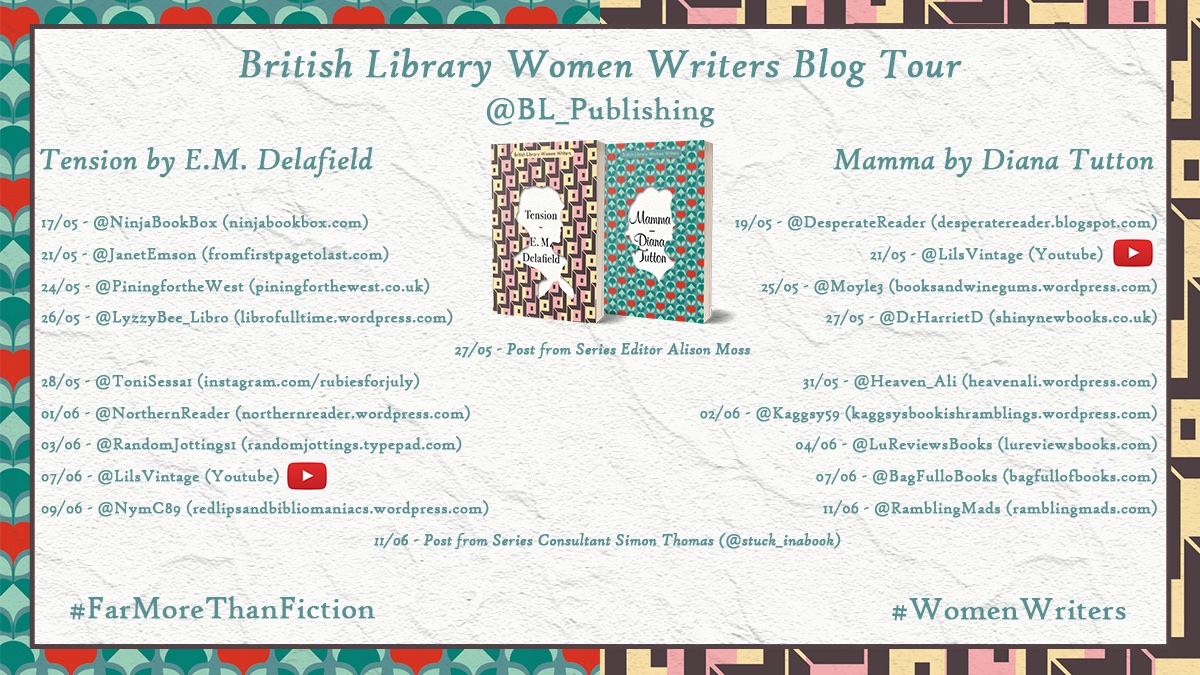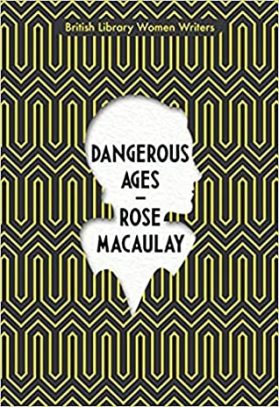 Two new British Library Women Writers titles are out YESTERDAY in the UK – Sally on the Rocks by Winifred Boggs and The Love Child by Edith Olivier, which are both up there among my favourites in the series so far. I was going to do one of my posts about them, but realised that I’d never actually done BLWW number 9, Mamma (1956) by Diana Tutton. (You can see my posts on all the series at the blww tag.)
Two new British Library Women Writers titles are out YESTERDAY in the UK – Sally on the Rocks by Winifred Boggs and The Love Child by Edith Olivier, which are both up there among my favourites in the series so far. I was going to do one of my posts about them, but realised that I’d never actually done BLWW number 9, Mamma (1956) by Diana Tutton. (You can see my posts on all the series at the blww tag.)
I first read Mamma in the Bodleian, after loving the extraordinary Guard Your Daughters but not being able to track down her other books. Older copies of Mamma do turn up now and then, but obviously this new edition is available to everyone easily!
When I read Mamma, I was a bit taken aback at first. Guard Your Daughters had been an instant favourite – almost from the first page. It was lively and funny and chaotic. Mamma is a much quieter book – it’s about Joanna, whose daughter Libby moves in with her to save money. She brings along her new husband Stephen, whom Joanna doesn’t know. He is much older than Libby – indeed, he is only a few years younger than Joanna. And gradually Steven and Joanna develop feelings for one another…
It sounds very sensational, whenever you try to describe it, but it really isn’t. It is such a gentle, thoughtful, and unsensational book – just looking at what might happen in this situation, between three decent people who don’t want to hurt each other.
When it came to writing my afterword, I ended up writing about sex – I always seem to veer into this for the series, and I’m worried that people will be alarmed. But the levels of discretion writers did or didn’t have about sex does seem to shift so much in the period – in fact, there’s a novel I’m hoping we’ll do next year that is very interesting on the topic, writing much less discreetly than you’d imagine for the era…
In Mamma, it’s all tied up with psychology and changing norms – particularly around celibacy before marriage.
“I don’t see,” said Elizabeth, smiling, “how anyone at all young can live without sex and not get warped.”
Steven’s feelings changed abruptly. Of all the tactless remarks! But Joanna answered peacefully: “Quite a lot do.”
“Well, they all get a bit peculiar.”
“I don’t think that’s altogether true.”
“Janet says it comes out in all sorts of funny little ways.”
“Well, good Lord, we’ve all heard that one,” said Steven impatiently. “But it’s by no means universal.”
“Even if it’s not visible,” calmly continued Elizabeth, “it’s still there. In fact if you can’t see if it’s probably worse.”
“Darling,” said Joanna, looking, as Steven gratefully noticed, not hurt, but amused, “we’ve all heard that, too.”
“Often,” added Steven.
“Oh, all right!” said Elizabeth, not at all offended. “But all the same, Janet says – ”
“A course in so-called psychology,” said Steven nastily, “doesn’t guarantee a profound knowledge of human nature.”
I’ve been interested to see some people preferring this novel to Guard Your Daughters – I still think that’s Tutton’s masterpiece, and one of my all-time favourite novels, but Mamma is such a different type of novel that they don’t really compare. Now we just need to decide if there is an appetite for her third and final novel, about brother/sister incest…







 If you click on the tag above, you’ll be able to see my posts about all the British Library Women Writers books as they come out – or, more often, some time after they come out. But Tension by E.M. Delafield only came out a couple of weeks ago – and I’m delighted, as Delafield was definitely one of the authors I was really hoping would get onto the list. But when she wrote so many books, so many of which aren’t in print (or are only POD and ebook), how would I choose?
If you click on the tag above, you’ll be able to see my posts about all the British Library Women Writers books as they come out – or, more often, some time after they come out. But Tension by E.M. Delafield only came out a couple of weeks ago – and I’m delighted, as Delafield was definitely one of the authors I was really hoping would get onto the list. But when she wrote so many books, so many of which aren’t in print (or are only POD and ebook), how would I choose?


 I intend to write about each of the British Library Women Writers titles as they come out, though I’m already a bit behind because the brilliant Father by Elizabeth von Arnim is also out now!
I intend to write about each of the British Library Women Writers titles as they come out, though I’m already a bit behind because the brilliant Father by Elizabeth von Arnim is also out now!